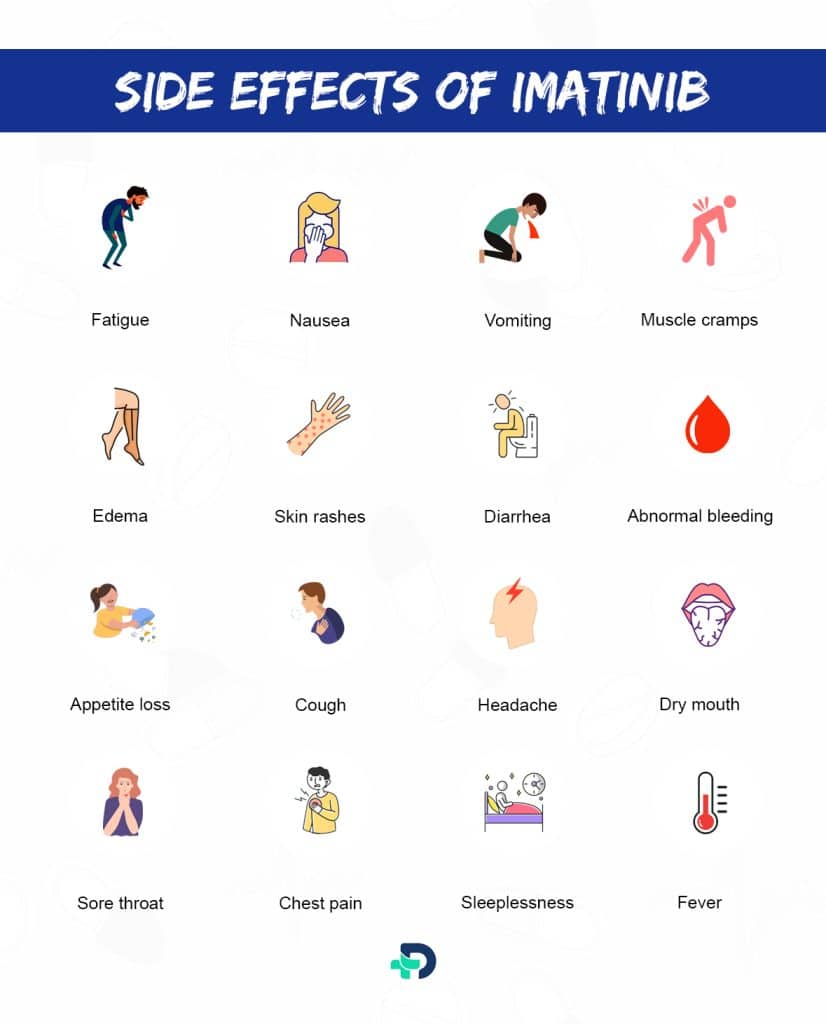Imatinib: Uses, Dosage, Side effects and Interactions

- Imatinib
- 22 Aug 2023
Overview
What is Imatinib?
Targeted therapy has been a ground-breaking strategy in the treatment of several diseases in contemporary medicine. The medicine imatinib has changed how chronic myeloid leukemia (CML), gastrointestinal stromal tumors, and other illnesses are treated. Imatinib is also known by its trade name Gleevec and has demonstrated remarkable efficacy in inhibiting specific molecular targets involved in the growth and proliferation of cancer cells.
This article delves into the mode of action, uses, dosage, administration, side effects, contraindications, risks, precautions, and interactions of Imatinib, offering a comprehensive understanding of this remarkable medication.

How does it work?
- Imatinib belongs to the class of medicines called as the kinase inhibitors.1Overview| Researched based study from Nlm.nih.gov
- It prevents the abnormal protein from signaling the growth of cancer cells. This slows the growth of cancerous cells.2Overview| Researched based study from Nlm.nih.gov
Uses
Uses of Imatinib
Imatinib is used either by itself or in conjunction with other medications to treat a variety of malignancies and bone marrow disorders, including:
- Chronic Myeloid Leukemia (Ph+ CML)
- Acute lymphoblastic leukemia (Ph+ ALL) 3Uses| Researched based study from Cancer.gov
- Myelodysplastic/myeloproliferative diseases (MDS/MPD)
- Aggressive systemic Mastocytosis (ASM)
- Hypereosinophilic syndrome (HES) 4Uses| Researched based study from Dailymed.nlm.nih.gov
- Dermatofibrosarcoma protuberans (DFSP)
- Gastrointestinal stromal tumor (GIST)
Chronic Myeloid Leukemia
That indicates a positive Philadelphia chromosome. It is utilized in both adults and kids with:
- A chronic phase illness with a recent diagnosis.
- A disease in the chronic, rapid, or blastic phases.
Acute lymphoblastic leukemia
- That is positive for the Philadelphia chromosome in both adults and kids.
- It is used in adults to treat diseases that have returned or are resistant to treatment.
- When a child has cancer, it is used along with chemotherapy as the initial course of treatment.3Uses| Researched based study from Cancer.gov
Myelodysplastic/myeloproliferative diseases (MDS/ MPD)
- Patients over 18 with Platelet-derived growth factor receptor (PDGF) gene rearrangements and Myelodysplastic/Myeloproliferative disorders (MDS/MPD).
Aggressive systemic Mastocytosis (ASM)
- Aggressive adult patients with Systemic Mastocytosis who have a specific c-KIT gene mutation.
Hyper eosinophilic syndrome (HES)
- Used in treating adult patients with HES who are negative for the fusion kinase or whose status is unknown, suffer from chronic eosinophilic leukemia (CEL) or hypereosinophilic syndrome (HES).
Dermatofibrosarcoma protuberans (DFSP)
- Adults with metastatic, recurring, or both diseases and who also cannot be surgically removed. 4uses| Researched based study from Dailymed.nlm.nih.gov
Gastrointestinal stromal tumors (GIST)
- GIST (gastrointestinal stromal tumor) sufferers whose tumors can’t be surgically removed or who have spread to other parts of their bodies.
- Adult patients whose KIT (CD117)-positive GIST has been eliminated following surgery.
Dosage
Dosage and administration
Imatinib mesylate Tablets are available containing imatinib equivalent of
- 100 mg 4Dosage| Researched based study from Dailymed.nlm.nih.gov
- 400 mg
The dosage of Imatinib for adults can vary depending on the condition being treated
- For Ph+ CML Accelerated phase or Blastic phase – 600 mg/day
- For Ph+ CML Chronic phase – 400 mg/ day
- For Ph+ ALL – 600 mg/day
- For MDS/MPD – 400 mg/day
- For HES/CEL – 100 mg/day or 400 mg/day
- For ASM – 100 mg/day or 400 mg/day
- For DFSP – 800 mg/day
- For GIST – 400 mg/day 5Dosage| Researched based study from Fda.gov
The dosage for kids is decided by the doctor according on their age and weight.
Administration:
- Gleevec dosages should always be taken with food and plenty of drink.
- 400 mg and 600 mg of a dose should be taken once daily, whereas 400 mg of 800 mg should be taken twice daily.
- Patients who have difficulties swallowing can dissolve it in water or apple juice.5Dosage| Researched based study from Fda.gov
Side effects

Side effects of Imatinib
While Imatinib has demonstrated remarkable efficacy, like any medication, it can lead to side effects in some individuals.
Common side effects may include:
- Fatigue
- Nausea
- Vomiting
- Muscle cramps
- Edema (fluid retention) 6Side effects| Researched based study from Nlm.nih.gov
- Skin rashes
- Diarrhea
- Abnormal bleeding
- Appetite loss
- Cough
- Headache
- Dry mouth 7Side effects| Researched based study from Medlineplus.gov
- Joint pain
- Sinusitis
- Body ache
- Sleeplessness
Most of these side effects are mild and manageable. Less frequently, some patients may experience more severe adverse effects, such as:
- Shortness of breath
- Sore throat
- Chest pain
- Yellow skin or eyes
- Sudden weight gain
- Coughing up blood
- Swollen hands, feet, ankles, or legs
- Swelling around the eyes
- Irregular heartbeat
- Blood in the stool
- Pale stool
- Fever or chills
- Excessive tiredness
- Abdominal pain
- Increased urination 7Side effects| Researched based study from Medlineplus.gov
- Unusual bruising
Contraindications
Contraindications
- Pregnant women – Pregnant women should avoid using imatinib since it may harm the growing fetus. To avoid getting pregnant while using Imatinib, sexually active women should utilize reliable birth control.8Contraindications| Researched based study from Gleevec.com
- Breastfeeding mothers – Because of the risk of serious adverse events in breastfed infants, do not breastfeed during Gleevec treatment and for one month following the final dosage.
- Hypersensitivity – Patients with a known hypersensitivity to Imatinib or any of its ingredients shouldn’t use the medication.
Precautions
Risks & Precautions
- Liver problems – Imatinib should be used cautiously for individuals with significant liver problems since it can exacerbate abnormal liver function. Before starting treatment and every month after that, or as clinically necessary, evaluate liver function.
- Hypothyroidism – Imatinib increases the risk of hypothyroidism, especially in patients on Levothyroxine replacement therapy for thyroidectomy. In such patients, pay close attention to TSH levels.
- Swelling due to water retention – Patients should be periodically weighed and take diuretics and a break from their medications to treat swelling brought on by water retention. 4Interactions| Researched based study from Dailymed.nlm.nih.gov
- Heart problems – there is a risk of severe congestive heart failure, especially in patients with comorbidities. Patients with cardiac illness or risk factors for cardiac failure should be watched and treated.
- Anemia, neutropenia, or thrombocytopenia – Perform complete blood counts every week for the first month, twice a week for the second month, and then occasionally after that if you have anemia, neutropenia, or thrombocytopenia.
- Gastrointestinal disturbances – Imatinib mesylate can cause gastric irritation and rarely gastrointestinal perforation.
- Skin problems – Gleevec use has been associated with bullous dermatologic responses, such as erythema multiforme and Stevens-Johnson syndrome.5Precautions| Researched based study from Fda.gov
- Risk of infections – Long-term Imatinib use increases the risk of infections since the drug may suppress the body’s natural immunity.
- Blood clotting issues – Imatinib may also interfere with blood clotting and interact with other drugs with similar effects, such as anticoagulants, calling for careful monitoring.
Interactions
Interactions
The liver’s CYP3A4 enzyme is principally responsible for metabolizing Imatinib. Imatinib’s efficacy and safety may be significantly impacted by medications that inhibit or stimulate CYP3A4.
- CYP3A4 inhibitors – Imatinib levels can rise when taken with CYP3A4 inhibitors, such as antifungal medications like ketoconazole and antibiotics like clarithromycin, raising the risk of side effects.4Interactions| Researched based study from Dailymed.nlm.nih.gov
- CYP3A4 inducers – Imatinib levels may be decreased by substances like some anticonvulsants (like phenytoin) and herbal remedies (like St. John’s wort), which may jeopardize the drug’s effectiveness. 4Interactions| Researched based study from Dailymed.nlm.nih.gov
- Drugs Metabolized by CYP3A4 – Drugs that CYP3A4 processes in the body will have higher plasma concentrations when Imatinib is taken. Warfarin should not be administered to patients who need anticoagulation because CVP3A4 metabolizes warfarin. Instead, low-molecular-weight or regular heparin should be given.5Interactions| Researched based study from Fda.gov
- Drugs Metabolized by CYP2D6 – Use caution while giving Imatinib mesylate tablets to patients taking CYP2D6 substrates with a limited therapeutic window.
- Acetaminophen – When given with Gleevec, acetaminophen exposure in the body is anticipated to rise.5Interactions| Researched based study from Fda.gov
- Grapefruit juice – should be avoided since it may raise the plasma levels of Imatinib.9Interactions| Researched based study from Cancerresearchuk.org
It is advised that individuals discuss all of their current medications, including prescription, over-the-counter, herbal, and dietary supplements, with their healthcare providers before beginning Imatinib because not all of the drugs listed above are known to interact with this drug.
Any feedback on this article?
 This Articles content was accurate
This Articles content was accurate Very Informative Article
Very Informative Article I have a question or a comment
I have a question or a comment
 This article contains inaccurate content
This article contains inaccurate content This article was not helpful
This article was not helpful I have a question or a comment
I have a question or a comment
We appreciate your helpful feedback!
Checkout our social pages
References
-
National Library of Medicine
Imatinib | Overview
-
National Library of Medicine
Imatinib | Overview
-
National Cancer Institute
Imatinib Mesylate | Uses
-
DailyMed
IMATINIB MESYLATE- imatinib tablet, film coated | Uses
-
FOOD AND DRUG ADMINISTRATION
GLEEVEC (imatinib mesylate) tablets | Dosage
-
National Library of Medicine
Imatinib | Side effects
-
Medline Plus
Imatinib | Side effects
-
Novartis Pharmaceuticals Corporation
Gleevec | Contraindications
-
Cancer Research UK
Imatinib (Glivec) | Interactions





































